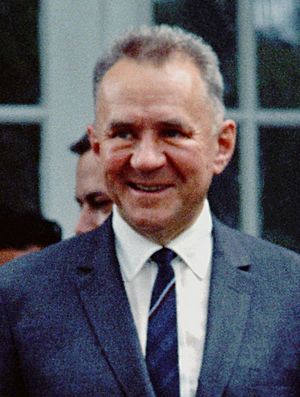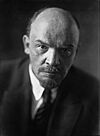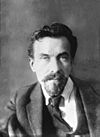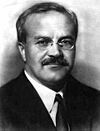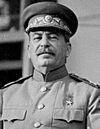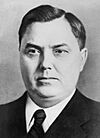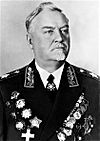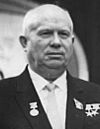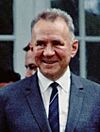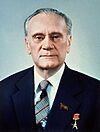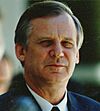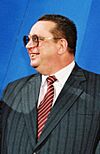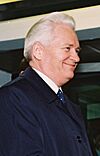Premier of the Soviet Union facts for kids
Quick facts for kids Premier of the Soviet Union |
|
|---|---|
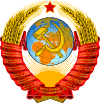
|
|
| Style | Mr. Premier (informal) His Excellency (diplomatic) |
| Reports to | Supreme Soviet |
| Residence | Kremlin Senate, Moscow |
| Appointer | Supreme Soviet |
| Formation | 6 July 1923 |
| First holder | Vladimir Lenin |
| Final holder | Ivan Silayev |
| Abolished | 26 December 1991 |
| Succession | Prime Minister of Russia |
| Deputy | First Deputy Premier Deputy Premier |
The Premier of the Soviet Union (Russian: Глава Правительства СССР) was like the chief manager or leader of the government in the Union of Soviet Socialist Republics (USSR). This important job was held by twelve different people during the USSR's history. Some of the most well-known Premiers were Vladimir Lenin and Joseph Stalin.
Contents
What the Premier Was Called
The name for this top government job changed four times over the years:
- Chairman of the Council of People's Commissars (1923–1946)
- Chairman of the Council of Ministers (1946–1991)
- Prime Minister (January – August 1991)
- Chairman of the Committee on the Operational Management of the Soviet Economy (August–December 1991)
Even though the official name changed, people outside the Soviet Union often just called the person in this role "Premier" or "Prime Minister" for a long time.
A Brief History of the Premier's Role
The first government of the Soviet Union was formed on July 6, 1923. Vladimir Lenin became its first leader, known as the Chairman. This government could create rules and laws that everyone in the USSR had to follow.
Alexei Kosygin served as Premier for the longest time. He became the head of government in 1964 after Nikita Khrushchev was removed from power. Kosygin tried to make some economic changes in 1965, but these ideas made his position less strong.
In 1991, when Valentin Pavlov became Premier, the "Council of Ministers" was changed to the "Cabinet of Ministers." Later that year, after a failed attempt to take over the government in August 1991, many cabinet members supported the coup. Because of this, the Cabinet of Ministers was dissolved. A new group, the "Committee on the Operational Management of the Soviet Economy," took its place.
After the coup attempt, the government of the Russian part of the Soviet Union started taking control of Soviet government departments. By December 1991, the Soviet government had completely lost its power and stopped working.
Under the Soviet Constitution of 1977, the Premier was the leader of the highest executive part of the government. The Premier was chosen by the Supreme Soviet (which was like the Soviet parliament). The Premier was in charge of managing the country's economy, creating big economic plans (called five-year plans), and making sure society and culture developed. This was a very important job until the position of President of the Soviet Union was created in 1990.
Two Premiers, Vladimir Lenin and Joseph Stalin, died while they were in office. Three Premiers chose to resign: Alexei Kosygin, Nikolai Tikhonov, and Ivan Silayev. Some Premiers, like Lenin, Stalin, and Nikita Khrushchev, were also the main leaders of the Communist Party at the same time.
The Premier who served the shortest time was Ivan Silayev, who was in office for only 119 days. Alexei Kosygin served the longest, for 16 years.
List of Premiers
| No. | Portrait | Name (Born–Died) |
Time in Office | How They Were Chosen | Governments | Ref. | ||
|---|---|---|---|---|---|---|---|---|
| Started | Ended | Length | ||||||
| 1 | Vladimir Lenin (1870–1924) |
6 July 1923 | 21 January 1924 † | 228 days | – | Lenin I–II | ||
| 2 | Alexei Rykov (1881–1938) |
2 February 1924 | 19 December 1930 | 6 years, 320 days | 1924 1925 1927 1929 |
Rykov I–II–III–IV–V | ||
| 3 | Vyacheslav Molotov (1890–1986) |
19 December 1930 | 6 May 1941 | 10 years, 138 days | 1931 1935 1936 1937 |
Molotov I–II–III–IV | ||
| 4 | Joseph Stalin (1878–1953) |
6 May 1941 | 5 March 1953 † | 11 years, 303 days | 1946 1950 |
Stalin I–II–III | ||
| 5 | Georgy Malenkov (1902–1988) |
6 March 1953 | 8 February 1955 | 1 year, 339 days | 1954 | Malenkov I–II | ||
| 6 | Nikolai Bulganin (1895–1975) |
8 February 1955 | 27 March 1958 | 3 years, 47 days | 1958 | Bulganin | ||
| 7 | Nikita Khrushchev (1894–1971) |
27 March 1958 | 15 October 1964 | 6 years, 202 days | 1962 | Khrushchev I–II | ||
| 8 | Alexei Kosygin (1904–1980) |
15 October 1964 | 23 October 1980 | 16 years, 8 days | 1966 1970 1974 1979 |
Kosygin I–II–III–IV–V | ||
| 9 | Nikolai Tikhonov (1905–1997) |
23 October 1980 | 27 September 1985 | 4 years, 339 days | 1984 | Tikhonov I–II | ||
| 10 | Nikolai Ryzhkov (1929–2024) |
27 September 1985 | 14 January 1991 | 5 years, 109 days | 1989 | Ryzhkov I–II | ||
| 11 | Valentin Pavlov (1937–2003) |
14 January 1991 | 28 August 1991 | 226 days | – | Pavlov | ||
| 12 | Ivan Silayev (1930–2023) |
28 August 1991 | 25 December 1991 | 119 days | – | Silayev | ||
See also
 In Spanish: Presidente del Consejo de Ministros de la Unión Soviética para niños
In Spanish: Presidente del Consejo de Ministros de la Unión Soviética para niños
 | William L. Dawson |
 | W. E. B. Du Bois |
 | Harry Belafonte |


